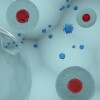
|
Are EVs travelling to injured lungs?
March 15, 2024
-
Tiny particles called extracellular vesicles (EVs) released by mesenchymal stem cells (MSCs) have shown clear potential to treat several lung diseases in animal models by reducing inflammation. However, there has been debate about where MSC-EVs end u
|

|
Exploring the frontiers of EVs & exosomes research
February 26, 2024
-
Our research community has emerged as a true innovator in EV/exosomes research, making new discoveries with potentially broad impact.
|

|
Powering up the body’s EVs
November 9, 2023
-
Dr. Alvin Tieu is receiving the Worton Researcher in Training Award from The Ottawa Hospital for his multidisciplinary research on life-threatening lung diseases
|
|
Show more news stories
|

|
From a project to a platform: A new and less expensive way to deliver immunotherapy
April 5, 2023
-
Exosomes are a promising vehicle for delivering immunotherapies for many reasons. They can target specific cells or tissues, their contents are protected from degradation, there is no danger of rejection by the host, and as vehicles for cell communic
|

|
Cancer-fighting viruses soften up their victims before attacking
April 7, 2022
-
A research team based at The Ottawa Hospital and the University of Ottawa has developed a virus that infects and kills cancer cells without harming normal cells, while also sending out signals to prepare nearby uninfected cancer cells for viral attac
|

|
Nano therapy for micro-preemies protects lungs, brain in lab study
March 30, 2022
-
Very premature babies need extra oxygen and mechanical intervention to breathe, but this damages their lungs, causing a chronic lung disease called bronchopulmonary dysplasia (BPD).
|

|
Tiny particles hold promise for treating acute and chronic lung disease
February 17, 2022
-
A meta-analysis of lab studies found that tiny particles called extracellular vesicles (EVs) released by mesenchymal stem/stromal cells (MSCs) have clear potential for treating acute lung injury,
|

|
Tiny bits of blood vessel may warn of newborn complications
November 4, 2021
-
A study published in Biomarker Research co-led by Drs. Dylan Burger and Denice Feig found that extracellular vesicles may be able to predict newborn outcomes, at least in pregnant people with diabetes.
|

|
MicroRNA protects mice from acute kidney injury
October 6, 2021
-
New research led by Dr. Kevin Burns shows that intravenous delivery of a type of microRNA can protect mice from acute kidney injury, a serious and untreatable condition.
|

|
Feature grant: researchers investigate why women on hemodialysis are at greater risk of cardiovascular disease
June 5, 2019
-
Drs. Dylan Burger and Marcel Ruzicka were awarded $48,000 to find out why women on hemodialysis seem to be at greater risk of cardiovascular disease.
|

|
How “exosomes” target injured kidney cells and bring them back to life
December 20, 2018
-
The kidneys are one of the most sensitive organs in the body. They are often the first to shut down during a critical illness like septic shock and the last to come back (if they come back at all). Dr. Kevin Burns and his team previously found that “
|
.jpg)
|
Could tiny bits of kidney cells in the urine be a potential warning sign of kidney disease?
February 2, 2017
-
Dr. Dylan Burger and his team have discovered that people with type 1 diabetes have more kidney microparticles in their urine than those without diabetes. These tiny pieces of cells released into the body by injured or dying cells have the potentia
|
